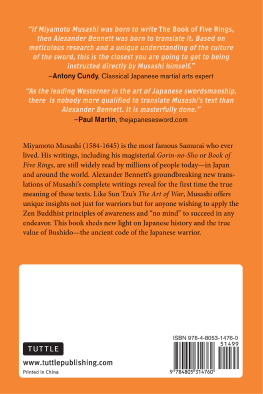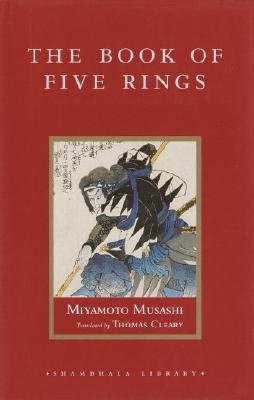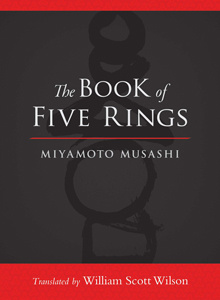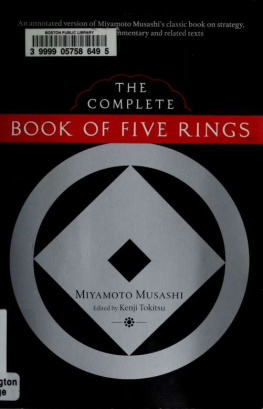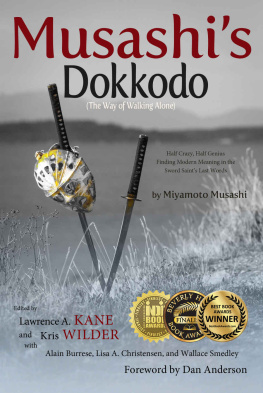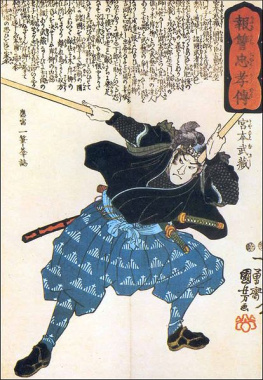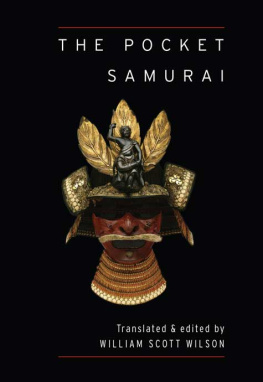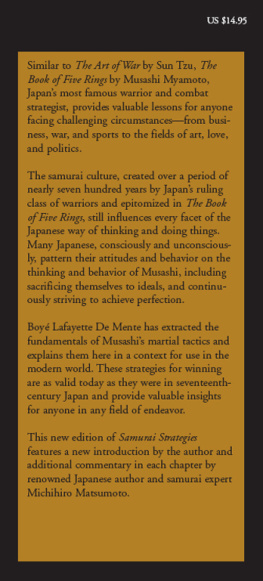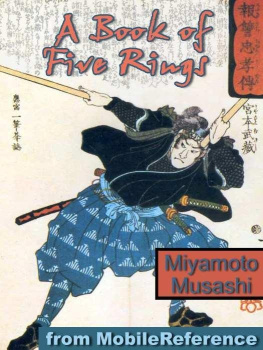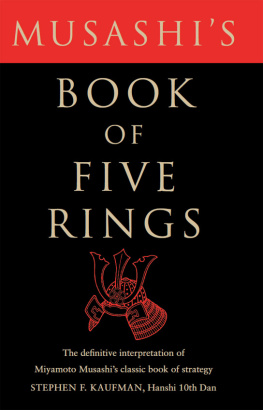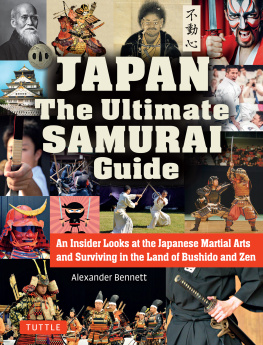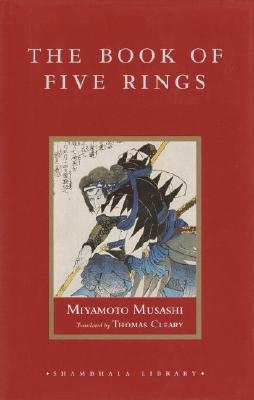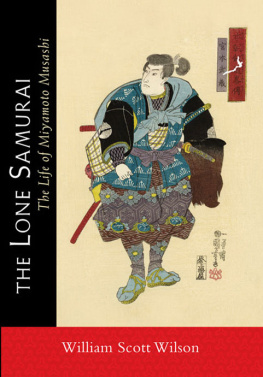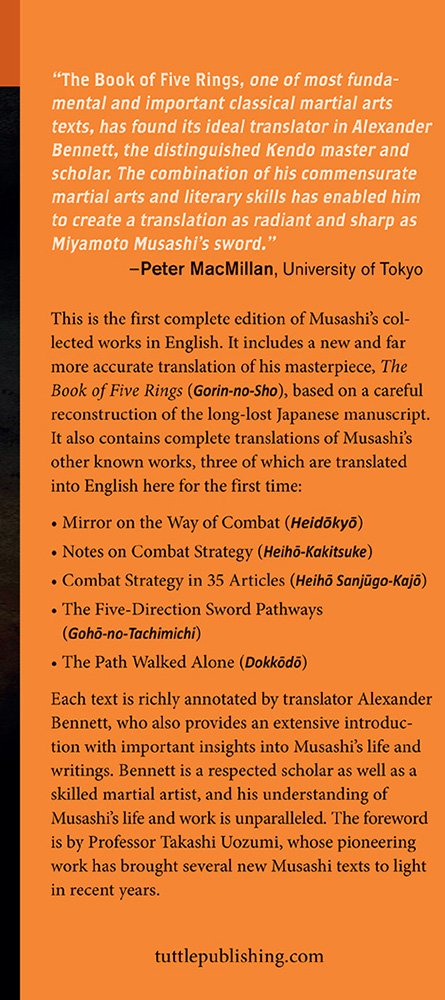
The Definitive Translations of the Complete Writings of Miyamoto MusashiJapans Greatest Samurai
THE COMPLETE MUSASHI
THE BOOK OF FIVE RINGS
AND OTHER WORKS
Translated with an Introduction byALEXANDER BENNETT
Foreword byTAKASHI UOZUMI
Dedicated to the memory of two modern Sword Saints
Ichiro Shirafuji (19452011) & Tadao Toda (19392016)

Foreword
Before Alexander Bennett began his translation of Miyamoto Musashis Book of Five Rings (Gorin-no-sho) there were already ten English translations in existence. In 2000, I spent two and a half years analyzing three of these translations with exchange students from the University of Texas. These texts were flawed in that sections were missing or the translators had misinterpreted Musashis words. Another problem with previous translations was that the commentaries were clearly influenced by novels. Because of this, I strongly felt it was necessary that an accurate translation of Musashis work should be published. This book is that translation.
The story of Miyamoto Musashi is well-known through the famous novel by Yoshikawa Eiji which formed the central storyline for many movies and television productions about the famous samurai swordsman. As such, the real Musashi has been largely obscured by fictional accounts. Back in 2002 when I was at the Budo and Sports Science Research Institute at the International Budo University, I focused my energies on collating as many sources related to Musashi as I could. I scrutinized all of them to corroborate their historical reliability, and on the basis of this I was finally able to form an accurate version of Musashis Gorin-no-sho which is the source Dr. Bennett has used to create this translation.
With swordsmanship at its core, Gorin-no-sho is an expos of the model warrior way of life. Musashi enjoyed the patronage of daimy lords as a guest in their domains, and his adopted son, Iori, became a Senior Councilor in the service of a daimy related to none other than Tokugawa Ieyasu. Throughout his career, Musashi participated in four military campaigns. Based on these experiences, in Gorin-no-sho he beseeches the warrior to not only excel above all others in his study of swordsmanship but to also aspire for excellence in all aspects of his daily life. He explains the modus operandi of dueling with swords, how it is pertinent to broader strategy in pitched battles, and how it applies to the mindset of a general. He advocates how warriors should comport themselves according to their social station and live their lives seeking perfection in the Way.
In my research, I identified two other texts believed to have been written by Musashi: Heidky and Heih-kakitsuke. It had previously been unclear whether Heidky was actually written by Musashi, but through a process of verifying six extant copies of the work and four related texts, I was able to show that Musashi did indeed write them in the winter of his twenty-fourth year. This coincided with the time he declared himself Champion of the Realm after defeating adherents of a famous school of swordsmanship in Kyoto. Also, by analyzing two existing copies of Heih-kakitsuke, in which he explained his swordsmanship principles when he was in his fifties, and various quotations that appear in subsequent texts circulating among students of Musashis school, I was able to prove that it was also written by Musashi. Heidky and Heih-kakitsuke are included below. Their addition will demonstrate to the reader how Musashis swordsmanship evolved throughout his career leading up to the writing of Gorin-no-sho.
In Heidky, Musashi expresses a decidedly pragmatic outlook on strategy following his many experiences in mortal combat. This is the first time Musashi attempted to record his techniques in writing, and so many sections in the original Japanese text are exceedingly difficult to follow. This is also the first time an English translation has been attempted and I am sure that it was an extremely difficult task. Looking at Musashis take on swordsmanship in Heidky, then the various combat approaches explained in Heih-kakitsuke to suit the situation, the reader will be able to appreciate even more the universal principles of swordsmanship that Musashi expounds upon in Gorin-no-sho.
Dr. Bennett holds the grades of 7th Dan in Kendo and high ranks in many other traditional Japanese martial arts. He is a practitioner of traditional swordsmanship and an academic researcher of the samurai ethos and culture. In 2001, Dr. Bennett launched Kendo World, the first English language journal dedicated to Kendo and related disciplines. This journal introduces Western readers to many theories of swordsmanship and hitherto untranslated materials related to Japans sword arts. The Budo and Sports Science Research Institute published three books in the Bud Ronsh series. Dr. Bennett contributed two chapters to these volumes, and also translated two of the books in the series. His level of research and ability to render complex ideas into highly readable translations is impressive to say the least and he is well qualified to take on the task of translating Musashis greatest work. I hope that this translation will be widely read and provide valuable insights into the life and thoughts of this great Japanese warrior.
March 15, 2018
Takashi Uozumi
Professor, The Open University of Japan
INTRODUCTION
Miyamoto Musashi
The Man, the Myth and the Manuscripts
Miyamoto Musashi (15821645) is the most celebrated samurai swordsman of all time. Yet details of his life remain shrouded in mystery. It is precisely this air of mystique, however, that adds spice to the fragments of his life story that are known with any certainty.
Like most people, I first became interested in Musashi through reading a popular work of fiction, the 1939 novel Miyamoto Musashi by Yoshikawa Eiji. as a young teenager alongside his childhood friend, Matahachi. Both navely hope to demonstrate their manhood through gallant deeds on the battlefield. They fight for the Western army against the great Tokugawa Ieyasu but their side suffers a disastrous defeat.
Deflated by his experience at the battle, Musashi abandons the material world and throws himself body and soul into the austere life of a dueling samurai swordsman. He is guided in this journey by the famous Zen priest Takuan Sh (15731645), who appears at critical moments to offer wise counsel, much like Gandalf in The Lord of the Rings.
Throughout the novel, Musashi teeters on a knifes edge between life and death, testing his mettle against the most famous swordsmen in the land. He duels the illustrious Yoshioka clan in Kyoto and defeats them all single-handedly through a combination of guile, recklessness and skill. The novels climax, however, is his celebrated duel with the formidable Sasaki Kojir on the remote island of Ganryjima.
Kojir, armed with a massive sword dubbed the Drying Pole, waits impatiently for Musashi to arrive by boat from the mainland. However, Musashi bides his time. During the voyage, he whittles a boat oar into a crude but brutally effective club-sword and fastens a band (hachimaki) around his head to prevent his hair from falling into his eyes. When the two finally meet on the beach, taunts are exchanged and tension builds. Reaching a crescendo, both men suddenly explode into action, but Musashi triumphs with a perfectly timed blow that crushes Kojirs skull. At the same moment, the tip of Kojirs Drying Pole slices Musashis
Next page
